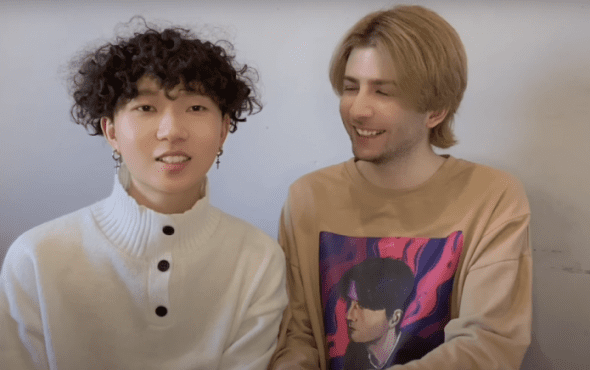
Social media stars Gela Gogishvili and Haoyang Xu were both arrested for breaking Russia’s so-called ‘gay propaganda law’.
Russian-born Gogishvili, 23, and Chinese national Xu, 21, crossed paths on a dating app two years ago after Xu moved abroad to study in Russia.
Since then, the pair have been dating in Russia, living in the city of Kazan, and sharing their experience with followers online.
The duo, who have over 65,000 followers on YouTube, share snippets of their lives together – holding hands and sharing a bed together, and recreating popular TikTok videos.
On April 6, Xu was arrested for promoting ‘non-traditional sexual relationships’, the Metro reports.
The couple were stopped in the street where the 21-year-old was demanded to show documentation, such as a passport or student visa, which he did not have with him at the time.
Both men were escorted to Yapeyeva police station, Newsweek reports, where the 21-year-old old was “pressured” to sign documentation.
Gogishvili and Xu were charged under Article 6.21 of Russia’s Administrative Offenses Code, which is more commonly referred to as Russia’s ‘gay propaganda’ law.
The pair are expected to have appeared in court yesterday. If found guilty, they could face a fine.
Ahead of their court date, the YouTubers took to social media to share their side of the story.
“We are threatened with fines and separation. Haoyang is a Chinese citizen and faces deportation to his homeland for violating the law on LGBT propaganda,” they shared on April 5.
“We hope for a better outcome. After all, there is no LGBT propaganda, orientation cannot be imposed, love is not propaganda. We will continue to fight for our love and hope for your support.”
Ksenia Mikhailova, a lawyer for the advocacy group Coming Out, spoke to the Metro explaining how Russia’s so-called ‘gay propaganda law’ can be particularly harmful to non-Russian LGBTQ+ people.
“(Article 6.21) of the Administrative Code against propaganda does not provide such a punishment (of deportation) for an arrest of a Russian citizen, only for foreigners,’ she explained.
‘The law affects queer people in all aspects of their lives because it’s difficult to predict what behaviours will be recognised by a court as positive LGBTQ+ representation.”
Russia has a long history of passing anti-LGBTQ+ laws. In November, the country took steps to extend the country’s archaic ‘gay propaganda’ law to all adults.
The discriminatory bill will now be forwarded to the Federation Council (the upper house of Parliament) before President Vladimir Putin signs it into law.
Russians will be restricted from “praising” homosexuality or publicly suggesting that homosexuals are “normal” under the legislation.
The proposed ban covers public acts, online content, film, books and advertising.
“LGBT today is an element of hybrid warfare and in this hybrid warfare we must protect our values, our society and our children,” Alexander Khinstein, one of the law’s architects, said in October of this year.
Despite homosexuality being legal in Russia since 1993, LGBTQ+ people face ongoing societal challenges in the country.
Hate crimes based on sexual orientation and gender identity are not prohibited by law, and no anti-discrimination protections for LGBTQ+ exist.



